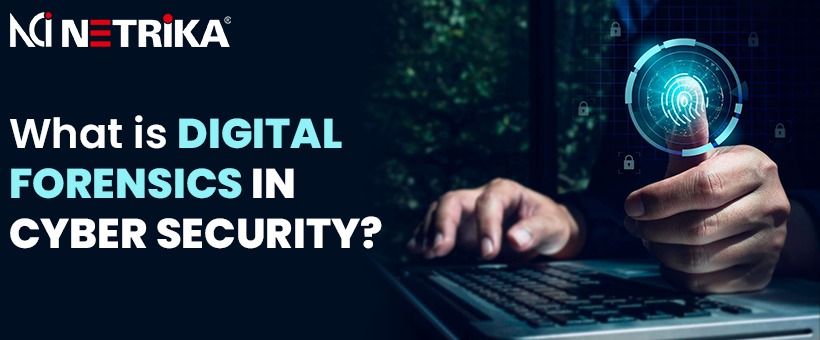- December 1, 2023
- Posted by: Netrika
- Category: DFIR

Digital Forensics In Cyber Security
Digital forensics is the process of storing, analyzing, retrieving, and preserving electronic data that may be useful in an investigation. It includes data from hard drives in computers, mobile phones, smart appliances, vehicle navigation systems, electronic door locks, and other digital devices.
Over the years, technological advancement has come to a stage where the chances of a business getting victimised accidentally are higher than ever. While a robust cybersecurity to detect, prevent and contain such attacks is crucial, the security structure will remain incomplete without having a strong foothold on digital forensics in cybersecurity.
Where cybersecurity helps your organisation prevent cyber crimes from occurring, it is digital forensics that helps you recover the data after the attack has happened, identify the perpetrator and lay the groundwork with reports on the attack to create an even more robust security ecosystem. Digital forensics is involved with identifying, collecting, preserving, analysing, documenting and reporting digital evidence of the crime to prevent hackers, viruses, and malware attacks from exploiting your system, and help in disaster recovery as well as the deleted data.
In fact, a recent surge of Mallox Ransomware attacks targeted at Microsoft SQL servers, with a 174% rise in 2023 as compared to last year is a classic example of leaving the MS SQL servers inadequately secured. The attack which has previously impacted industries including professional services, manufacturing, wholesale, legal, retail and pharma is gaining a strong base with a much broader scope. Digital forensics in such cases proves true to its name that if it is poorly designed, implemented or not performed at all, cyber attacks can penetrate again, causing much more damage to the finances and reputation of the organisation.
Recent trends in digital forensics
- Cloud Forensics: Cloud computing is a massive resource pool with wide storage access and applications across industry verticals. It also presents an opportunity for fraudsters to exploit it to their advantage. Thus, cloud forensics is gaining attention from investigators to resolve and restore cloud security and privacy issues.
- IoT Forensics: IoT systems present complex challenges for digital forensics to address as they contain massive resources and unique devices. When combined with digital forensics tools, it can trace criminal acts to help speed up the investigation process.
- Intrusion Detection: Intrusion detection under digital forensics has opened doors for detecting malicious activities, monitoring traffic data and determining the nature of intrusion. The system administrator is notified when the system is compromised in order to discover and remedy the damage as quickly as possible.
Identifying the threat actors across the digital domain, understanding their tactics, recovering from simple and complex attacks, security systems so fraudsters cannot exploit the vulnerabilities, and implementing strong measures to prevent potential attacks is what digital forensics is all about. It can be safe to say that cybersecurity and digital forensics go hand in hand for any business to protect itself from threat actors.
However, employing these practices requires a digital forensics services team that has proven expertise in the area, seasoned professionals to give you tailored strategic solutions and the acuteness to look beyond what is visible to the eye. Netrika Consulting is one of the best in the digital forensics services business to offer you efficient, secure, sustainable solutions with an integrated approach to investigate such attacks with speed and precision.
